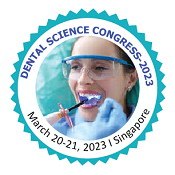
Hadi Hamidi Shishvan
AJA University of medical sciences, Tehran, Iran
Title: Evaluation of bacterial contamination of radiology sections and comparing the antibacterial effect of two disinfectant solutions in the radiology department of the faculty of dentistry, Aja University of Medical Sciences
Biography
Biography: Hadi Hamidi Shishvan
Abstract
The dental work environment can be a way of transferring diseases. Therefore, infection control in dentistry is a necessity. So far many disinfectants have been made by different companies. Therefore, it is very difficult to select a suitable disinfectant. . The purpose of this study was to compare the different levels of the radiology department in terms of type and number of bacteria and compare the antibacterial effect of two disinfectant solutions used in the department of radiology. In this descriptive-analytical study, the correlation coefficient test was used for statistical analysis.
In this study, samples of the control panel, radiographic head, lightbox, door handle, and working desk of the radiology department were taken. Samples were taken for 4 times each day. Before working hour starts, right after starting the working day, and when the working day finishes, and after disinfecting the environment. 60 samples were taken. In order to compare the type of disinfectant, the ‘Septi Surface’ was used to disinfect in the first two days and the ‘Surfo-Septi” was used to disinfect over the second two days. From 60 samples collected in 15 cases of bacterial colony growth. The overall level of bacteria in some surfaces is high such as the door handle and the working desk. At some surfaces there was a high incidence of infection with Staphylococcus epidermidis, Streptococcus viridans, Staphylococcus aureus, and Bacillus subtilis. Due to the greater contact of patients with the door handle, there was a higher level of infection than on the rest of the surfaces. On the other hand, the radiographic head has less bacterial growth than the other parts due to proper coverage.

